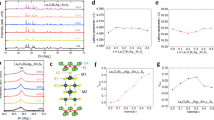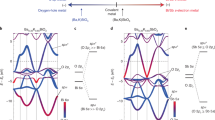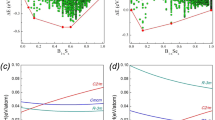Abstract
IN a recent paper1 we reported on semiconductivity in CoSb2-type compounds. The ternary analogues of these polycompounds are formed by the arsenopyrite group. The monoclinic minerals arsenopyrite, FeAsS, and gud-mundite, FeSbS, closely correspond to the mineral safflorite, CoAs2. They have the same number of valence electrons and we therefore expect their cations to have the same d-electron configuration. In CoAs2 we have found a magneton number much smaller than that corresponding to one unpaired spin1. A measurement of the magnetic susceptibility of a natural arsenopyrite crystal (from Altenberg, Silesia, the same on which resistivity measurements were performed earlier2) of unknown purity showed a very similar behaviour (see Table 1).
This is a preview of subscription content, access via your institution
Access options
Subscribe to this journal
Receive 51 print issues and online access
$199.00 per year
only $3.90 per issue
Buy this article
- Purchase on Springer Link
- Instant access to full article PDF
Prices may be subject to local taxes which are calculated during checkout
Similar content being viewed by others
References
Hulliger, F., Physics Letters, 4, 282 (1963).
Hulliger, F., Helv. Phys. Acta, 32, 615 (1959).
Author information
Authors and Affiliations
Rights and permissions
About this article
Cite this article
HULLIGER, F. New Semiconducting Arsenopyrite-type Compounds. Nature 201, 381–382 (1964). https://doi.org/10.1038/201381a0
Issue Date:
DOI: https://doi.org/10.1038/201381a0
Comments
By submitting a comment you agree to abide by our Terms and Community Guidelines. If you find something abusive or that does not comply with our terms or guidelines please flag it as inappropriate.



